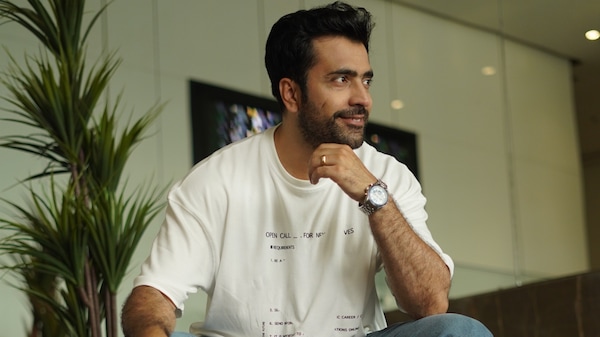Exclusive! Abir Chatterjee: What is a hit Bangla film? There's no way to know because there is no available data to corroborate claims
In an interview with OTTplay, Abir opens up about why he feels Alaap is like a breather for him and why he thinks there is no benchmark of ‘box-office success’ of a Bengali film. Read on…

Last Updated: 07.36 PM, Apr 20, 2024
Abir Chatterjee and Mimi Chakraborty are all set with their upcoming film, Alaap. Directed by Premendu Bikash Chaki, the film also features Swastika Dutta. In an interview with OTTplay, Abir opens up about why he feels Alaap is like a breather for him and why he thinks there is no benchmark of ‘box-office success’ of a Bengali film. Read on…
After working in a thriller like Raktabeej, you and Mimi are back as a pair once again. However, this is a love story. What thoughts went into saying yes to Alaap?
I would call it a romantic film with fun moments. It is a full-on premer chhobi. That’s why I liked it even better. Mimi read the script before I did. She and I were discussing whether we should do a film together so soon after the success of Raktabeej. Then we realised that this film has absolutely no connection with Raktabeej. This film is like a breather for me. There is no detection; I am not finding any hidden treasure, nor am I deeply brainstorming over something very serious.
Your character and Mimi's character never meet. How does the chemistry work?
This is one of the reasons I liked the plot. There is this sense of old-school romance, where the hero and heroine scribble and exchange handwritten notes. There are silent moments and a scope of self-realisations where my character has a dialogue with himself on why these things are happening. I am old-school and I like that kind of romance. They never meet and there lies the charm.

How was the journey for Alaap?
We did a lot of improvisation. Mimi’s character smokes in the film. There is a sequence that involves a matchbox. Chakida suggested that my character should also smoke. I said no. While brainstorming, I thought, 'What if my character is pious (I am not in real life though) and lights a lamp every day?' When I suggested the idea, Chakida readily agreed. That’s how we improvised.
You and Mimi are considered to be a hit pair after Raktabeej. Does that success influence you to work again with her?
We have decided to work on this film, not because of the success of Raktabeej. We agreed because we liked the story and the characters. You cannot overuse a pair just because their chemistry worked in a few films. There has to be an x-factor that cannot be defined. I love Shah Rukh Khan and Juhi Chawla’s pair more than Shah Rukh-Kajol jodi. SRK and Juhi are also great friends in real life. That gets reflected. On the other hand, there are instances where people loved a pair when the hero and heroine were not so great friends. It just works.
You have worked in all sorts of detective films and thrillers in the Bengali industry. Alaap is a sudden change in the genre…
Alaap came as a breather. I could identify with Pablo’s emotional journey. That is why I am slightly nervous. Since I really liked this character and the journey of the film, I will be disappointed a little more if viewers don’t like the film. Alaap is not just a professional venture for me. I liked Pablo’s emotional journey a little more. Hence, if that is ignored or rejected by the audience, I will feel bad.
Abir, you are also the poster boy of so-called non-mainstream Bengali films that are more popular among urban middle-class audiences…
People hurl abuse at me for that (laughs). This is a big discussion. Sometimes our fans are too proud to admit that they are our fans. They come and say that their daughters, sons, mothers, and relatives are fans. But they never admit that they are our fans too. Urban middle-class ego stops them from admitting that they are also our fans. This happens truly because most of these people and I come from the same social standard.
Second, many of the people around me tell me that I have no audience beyond Howrah. That’s rubbish. This is a false notion created by some people for their own benefit. That has been popularised. Do we seriously talk about the demography of our audience ever? No. Many of my audiences, who admire the kind of films I work in, live outside Bengal, even abroad. Why they live abroad is a socio-political discussion that we don’t indulge in. Most of the people left this city to find jobs.
Anyway, since these people live abroad or outside Kolkata, do we get to make films for them? No. They don’t go to theatres to watch my films. They watch it on Hoichoi or Hotstar. We don’t take these people into account when we define the audience for our films.
Also, who knows or decides the location or demography of the films I work in? It is a general perception that these urban films only have viewers in the city areas. But how do you know that these people are not from Ariadaha, Balurghat, or some other town? These people are often quiet for some reason and they don’t always speak up.
When mainstream commercial films are doing well across India, we see very little of it in the Bengali film industry. How do you see this trait?
Yes, we often discuss the fact that commercial films are not being made as much as they used to. But why aren’t they being made? Who’s stopping the makers? The deciding factor is the return on investment. Has it stopped? Why has it stopped? I am curious to know. We constantly hear that the number of single screens has gone down. Out of 800 theatres, there are only 200 left. Who shut them down? Whose responsibility is it to take care of this anyway? I am told that I am the poster boy of non-commercial films. That’s what you said. Is it a conspiracy that I hatched so that commercial films are not made in Bengal? I did not do it. Either those who used to make them or those who used to watch them are responsible.
I worked in Royal Bengal Tiger and it is one of my favourite roles. If I get the same character again, I really would not know how to go about it. When it was released, my fans said, “Oh, this is with Jeet? We won’t watch it.” This was weird. They could have rather said, “Let’s check out what Abir is doing here.” Where is the loyalty? As a result, neither Jeet nor Rajesh Ganguly (director) nor I worked on another such film. Debaloy Bhattacharya (director) and I both knew no one would watch Shri Swapankumarer Badami Hyenar Kobole. As a result, there will be no experiment like Badami Hyna tomorrow. Debaloy told me that he would be super conscious when choosing his subject so that people would love it.
Also, if this trend goes on, I would again go back doing Sonada. It is not just the responsibility of makers to make one such film but the viewers should also watch them. Ankush took a huge risk to make something like Mirza. You go and watch it. If there is one success story there will be one more experimental film.
And what about the box office?
And finally, who decides the success of a film at the box office? Where are the figures? Then why are we even discussing this? Where is the benchmark? Where are the authentic figures? How do we know which film is really successful and which one is not? If we need to do an objective analysis, we will need figures. And figures are never there. Then what is the point of even discussing it?
Subscribe to our newsletter for top content, delivered fast.

